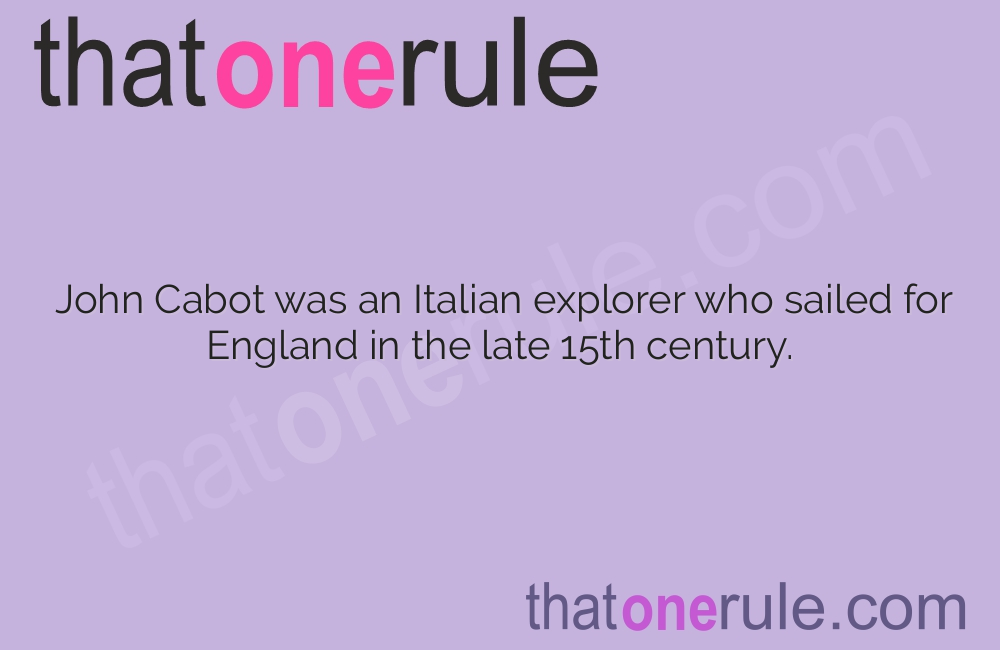Fascinating Facts about John Cabot

John Cabot was an Italian explorer who sailed for England in the late 15th century.
Cabot was born as Giovanni Caboto in 1450 in Italy.
John Cabot is credited with the discovery of North America for England.
His first voyage to North America took place in 1497.
Cabot’s ship on his first voyage was called the Matthew.
The exact location of Cabot’s first landing in North America is still debated.
It is believed that Cabot landed somewhere in present-day Newfoundland, Canada.
Cabot claimed the land he discovered for England and named it Newfoundland.
Despite the claim, Cabot’s discovery did not lead to immediate English colonization in North America.
Cabot’s second voyage to North America occurred in 1498.
The details of Cabot’s second voyage are less clear than his first.
Cabot’s fate after his second voyage is unknown, and he is presumed to have died at sea.
Cabot’s discoveries paved the way for future English exploration and colonization in North America.
John Cabot is often considered one of the first Europeans to reach mainland North America since the Norse.
Cabot’s voyages were sponsored by King Henry VII of England.
Cabot was searching for a northwest passage to Asia during his voyages.
Cabot’s discoveries influenced subsequent explorers, such as Henry Hudson.
Cabot’s initial discovery of North America did not lead to immediate settlement, unlike Christopher Columbus’ discoveries in the Caribbean.
Fascinating Facts about John Cabot part 2
Cabot’s voyages opened up new trade routes and opportunities for England.
Cabot is known to have had a son, Sebastian Cabot, who followed in his father’s footsteps as an explorer.
Cabot’s discoveries had a significant impact on the European understanding of the world.
Cabot’s voyages were part of the larger Age of Discovery in Europe.
Cabot’s exploration of North America helped lay the groundwork for future English colonization efforts.
Cabot’s discoveries challenged the idea that Asia could only be reached by sailing westward.
Cabot’s expeditions were perilous, as they faced harsh weather conditions and navigational challenges.
Despite the risks, Cabot was determined to find a northwest passage to Asia for England.
Cabot’s legacy is commemorated through various statues and memorials in North America.
Cabot is sometimes referred to as the discoverer of North America.
Cabot’s discoveries inspired other European nations, such as France and Spain, to explore and claim new territories.
Cabot’s voyages contributed to the growing competition among European powers for territorial expansion.
Cabot’s successes as an explorer proved that it was possible to reach new lands by sailing across the ocean.
Cabot’s voyages were significant not only for England but also for the broader European exploration efforts.
Cabot’s discoveries sparked a renewed interest in finding a direct trade route to Asia.
Cabot’s expeditions encouraged other explorers to venture into unknown waters.
Cabot’s discoveries added to the growing body of knowledge about the Earth’s geography.
Cabot’s voyages helped shape the modern map of North America.
Cabot’s journeys were a testament to human curiosity and the desire to explore unknown lands.
Cabot’s discoveries had a profound impact on the subsequent history and development of North America.
Cabot’s expeditions were conducted during a time of great maritime exploration and technological advancements.
Cabot’s discoveries revealed the vastness of the unexplored world and ignited a sense of wonder and possibility.
Cabot’s explorations marked a turning point in the world’s understanding of its geographical boundaries.
Cabot’s voyages laid the foundation for future transatlantic trade and cultural exchanges.
Cabot’s legacy as an explorer continues to inspire new generations of adventurers and discoverers.
Cabot’s boldness in sailing into the unknown exemplifies the human spirit of exploration and conquest.
Cabot played a crucial role in shaping the course of European history and the colonization of North America.

